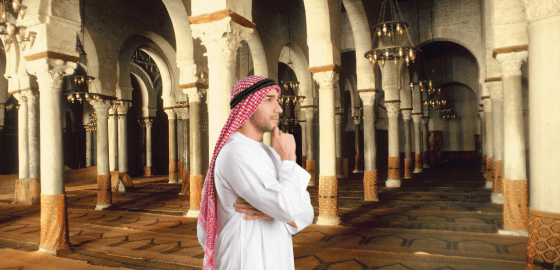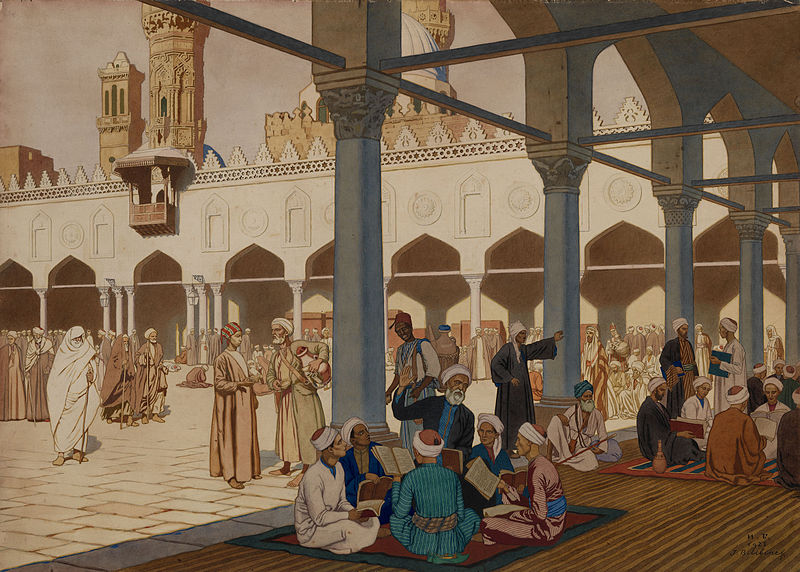This article is an extract from Earning Barakah: An Islamic Guide to Blessed Sustenance. Learn more about the book here.
To attain inner peace, we need to replace our materialistic paradigm with Zuhd. Zuhd is an often misunderstood Arabic term which in some circles is linked to poverty and self-torture. This is far from the Islamic understanding of this topic. The Arabic word Zuhd is often translated into English as Abstinence. While this translation is plausible, it is rather vague and easily misinterpreted.
The actual definition of Zuhd is to detach one’s heart from this world. Hence, self-discipline may be the closest English concept to Zuhd, but that too does not do the term justice. How we define Zuhd is very important. The definition shapes our understanding of the topic. When Zuhd is linked to poverty, it takes people in the wrong direction. When it is focused on the state of our hearts, it becomes a productive powerful tool for growth. Zuhd is not so much about wealth, status, or lifestyle as it is about purifying the heart of greed and materialism.
In this sense, Zuhd is the opposite of materialism. This is when we take materialism to mean the obsession with the things of this world causing one to forget the Afterlife. Zuhd means to focus on the next life, but without neglecting one’s portion of this world. This distinction is key as it separates the correct understanding of Zuhd from any misinterpretation. Islam is a religion of balance and does not ask us to abandon this world, rather it teaches us to prioritize the Afterlife.
Zuhd is necessary for attaining contentment and inner peace. A heart that is attached to this world is restless and always wanting more. A heart that prioritizes the Afterlife is content and at peace with the will of God. This is why Zuhd is a crucial topic to discuss when talking about inner peace.
There are many levels of Zuhd in Islam, the most basic level being to abstain from the prohibited things in this world like alcohol, gambling, fornication, and adultery. Abstaining from the Haram is obligatory upon every believer which makes this level of Zuhd obligatory on every believer. Striving for Zuhd is not just a higher ideal, it is necessary for purifying our souls.
The next level is to abstain from the disliked things of this world (Makruh) which includes wasting time, overeating, oversleeping, and bad manners. After prioritizing abstinence from the haram, we must abstain from the Makruh as well. Avoiding the disliked acts creates a barrier between us and Haraam because someone who stays away from the disliked acts is less likely to fall into the major sins.
Along with avoiding the Makruh, we also need to avoid doubtful matters to attain this level. These refer to things which the scholars have differed over. i.e. any issues in which one scholar may say something is permissible but another may say that it is prohibited. This includes things like listening to musical instruments, shaving the beard, and frequenting doubtful places. These things may be differed over on websites, forums, and books of Fiqh, and one is free to follow whichever opinion one believes is strongest. However, the safer route is to avoid anything that is doubtful, because avoiding the doubtful protects one from falling into the Haram.
There exists an even higher level of Zuhd than all of this. This is the level of piety, the level of the friends of Allah; abstaining from permissible things that waste time. For someone who already strives to avoid the prohibited, disliked, and doubtful matters and wants to take his abstinence to a higher level, the next level is to avoid the permissible things that distract you from Allah.
This concept may sound strange to some, and it is not necessary to attain salvation, but it is the path to higher levels of spirituality. This level of Zuhd means abandoning permissible things that you find distracting so that you can focus on what is important. This level of Zuhd is actualized when someone chooses to study Islam or read a book over watching a series or playing a videogame. While the latter may be Halal, the former is more virtuous and beneficial. Prioritizing that which is virtuous and beneficial over that which is permissible is the essence of focusing on the Afterlife.
There are many benefits that one can gain from living a life of Zuhd. Not only does it lead to contentment and inner peace, but it frees up time and resources that can then be put to better use. The same time and money that was previously spent in extravagant gatherings and unnecessary branded items can now be used for charity, humanitarian efforts, and personal development. The result is a better usage of one’s time and a happier soul.
Dangers of Materialism
Materialism is the opposite of Zuhd and it is the dominant mindset in the modern consumer culture. We are bombarded through the media, education system, and marketing industry with messages of greed and extravagance. We are taught that to be happy we need a certain type of car, home, and a degree from a specific university.
Yet all of these things are superfluous and have no real impact on a person’s happiness. Happiness is not related to what you own, rather it is related to what you do with your life.
Materialism is a major problem today which is taking people away from Allah, consuming lives, causing mental health problems, and breaking families. (NOTE: Materialism in this article is referring to the spiritual disease of obsessing over wealth and worldly possessions.)
Allah warns us against materialism in Surah At-Takaathur:
“The competition to pile up the good things of this world (At-Takaathur) distracts you until you visit the graves (i.e. until you die), No! Then you will come to know! Again, No! Then you will definitely come to know! No! If only you had true knowledge! (of the end of a person who chases this world) You will definitely see Hell-fire! You shall see it with your own eyes! Then, on that day you will be asked about how you spent the bounty (that Allah blessed you with).”
Surah At-Takaathur 102:1-8
As mentioned in this Surah, the worst result of materialism is that it causes a person to forget the purpose of life. We become so obsessed with gaining more and more of this world that we forget about what is most important, pleasing our Creator and building our homes in the Afterlife. This is what we are supposed to strive for.
Materialism is the opposite of Zuhd. It is an obsession with collecting worldly things. Materialism is all around us in the modern world. Schools, universities, family, culture, television, and advertisements all seem to be pushing a materialistic agenda. Materialism is not a happy road to go down, it is a deceptive path that leads to many psychological and behavioral problems. From among the dangers of materialism are the following:
- Corruption of intentions – Materialism leads to a person being obsessed with this world. This obsession clouds one’s judgment and messes up one’s intentions. A person who is obsessed with his world will not think about the Afterlife, make decisions based on the pleasure of Allah or develop noble goals. Greed clutters his mind and he becomes obsessed with selfish pursuits that take him away from the pleasure of Allah. This in turn leads to many other problems.
- Lack of contentment – When one’s heart is detached from Allah and obsessed with the world, the result is restlessness and a lack of contentment. Such an individual is never satisfied, always looking at things that he doesn’t have, desiring them, and never grateful for what he has.
- Fear of poverty – No matter how wealthy he becomes, a materialistic person is so obsessed with his wealth that he is constantly afraid of losing it all. He fears poverty more than anything else. As a result, he can’t sleep well at night and is obsessed with hoarding his wealth. This in turn makes him stingy.
- Debt – If a materialistic person doesn’t have the wealth to purchase whatever he desires, he decides to purchase it on loan. How many people today drive cars they can’t afford and live in homes that they can’t pay off? These things are purchased on loan in order to have the worldly possession here and now. The result is a lifetime of debts that fills the heart with a guilty feeling and removes any sense of inner peace
- Jealousy – A materialistic person eyes the possessions of others and if he can’t afford them himself, he becomes jealous of others. This jealousy builds up and causes him to do evil things in order to undermine the good in others or take away what is rightfully theirs. It also ruins his relationship with Allah as he becomes ungrateful and begins to question Allah’s decision to give that other person what He did not give him.
- Hatred – A materialistic person’s jealousy of someone eventually boils over into pure hatred. He begins to hate those who have that which he can’t have. Along with this, he begins to hate the righteous and the religious people. People who have hearts full of hatred cannot experience inner peace
- Anxiety – A materialistic person is always worried about the future and whether he will be financially secure in the future. His obsession with having everything he desires in this world drives him crazy with anxiety. This feeling keeps him up at night and stops him from enjoying what he currently has.
- Depression – Depression is very common among the wealthy today. This is because of materialism. A Wealthy person whose heart is attached to Allah can fight off depression but a materialistic person does not have that connection with Allah and so he experiences an emptiness inside.
- Enslavement to society – Finally, obsession with this world drives people to become enslaved to the fashions, expectations, and norms of society. Such a person is not free to be himself or chase his own goals. He is too caught up in keeping up appearances and looking good. This consumes his life and destroys his sense of purpose and identity.
From these points, it becomes very clear that materialism is a dangerous mindset that every Muslim must avoid. In order to attain inner peace, Zuhd is crucial.
Misconceptions about Zuhd
Before we discuss how to nurture our Zuhd, we first need to clear up all misconceptions on this topic. As with most Islamic concepts, 1400 years of history has led to many things being misunderstood and misinterpreted over time. Zuhd is one such concept.
In some circles, the word Zuhd or Zaahid (person who has Zuhd) conjures up an image of a poor person who doesn’t work and dedicates all his time and effort to worship Allah. However, this idea contradicts the practice and attitude of the Prophets, Companions, and early Muslims.
Zuhd does not necessitate poverty. Islam does not glamorize poverty or regard it as an ideal in life. Rather, one of the fundamental goals of Islam is the preservation and development of wealth. Wealth is important for Muslims as it is a resource that can be used to worship Allah, uplift society, and make this world a better place.
This can clearly be seen in the practice of the Sahaba. The leading Sahaba were not all poor people, some were wealthy traders and it was through their wealth that the community was uplifted and the ummah empowered.
The first believer was Khadija (RA) and she was a wealthy businesswoman. In the early years, it was her wealth that supported and funded the Dawah of her husband Prophet Muhammad (peace be upon him).
Likewise, the first man to embrace Islam was Abu Bakr (RA) and he was also a wealthy and influential businessman. He used that wealth to purchase slaves who had converted to Islam and set them free. Abu Bakr (RA) was among the greatest examples of Zuhd, yet he worked, earned well, and used that money to uplift society.
Uthman Ibn Affan (RA) was also one of the early converts and one of the greatest companions, yet he was a well-known millionaire. During the Madinan era of the Prophet’s life, it was the wealth of Uthman (RA) that funded many of the expeditions and purchased many necessities for the community, including their primary source of water. Abdur Rahman Ibn Awf (RA) was also one of the ten greatest companions. He too was a wealthy businessman who used that wealth to uplift the ummah and fund the expeditions of the Prophet (peace be upon him).
All of these examples make it quite clear that many of the greatest Muslims did not abandon earning a living or gaining wealth. They were wealthy, worked hard, and utilized that wealth to benefit the ummah. That is the essence of Zuhd: To keep wealth in one’s hands, and not let it enter one’s heart.
This makes it quite clear that Zuhd does not mean poverty, abandoning work, or abandoning the good things of this world. Zuhd is a condition of the heart and it reflects in how we deal with this world and with wealth itself. A person can earn well, work hard, be wealthy, and still have Zuhd. Alternatively, a man can be poor, lazy, and still be attached to this world. It is essentially the condition of the heart that reflects one’s level of Zuhd.
Zuhd does not mean abandoning the basics of life and enforcing upon oneself hardship. Allah sent Islam as a gift to humanity to remove hardship and help us attain that which is beneficial for us. Allah wants us to enjoy the Halal and benefit from what He has created.
To enforce difficulty upon oneself is not acceptable and against the fundamental goals of Islam. Ayesha (RA) narrated about the Prophet (peace be upon him) that whenever he was given a choice between two things, he would choose the easier of the two as long as it was halal. In this way, he set the example for us that Islam teaches us to choose the easier path to Paradise as long as it is Halal.
Zuhd is not about dressing shabby, because the Prophet (peace be upon him) and his companions would dress well. He taught them that dressing well is part of the beauty that Allah loves from us. Zuhd is not about being strict and unfriendly because you are focused on the Afterlife. There was nobody more focused on the Afterlife than the Prophet (peace be upon him) but he laughed, joked, smiled, and was one of the friendliest people you would ever meet.
Many of the misconceptions about Zuhd reflect a strict difficult understanding of Islam. This is in of itself a problem as Islam is meant to be the religion that brings ease to mankind. Obeying the laws of Allah should make life easier for us. Therefore, any understandings of Islam that encourage unnecessary hardship and abandoning the beneficial things of this world are incorrect understandings.
Tips for maintaining Zuhd
Now that we have defined Zuhd, cleared up misconceptions about it, and explained the dangers of materialism, we can now focus on how to grow and nurture our Zuhd. The following tips will assist you in keeping the world out of your heart and staying focused on the obedience of Allah.
Look at those who have less than you, not those who have more than you
This is taken verbatim from a Hadith of the Prophet Muhammad (peace be upon him). It has also been proven true by modern psychological studies. The way it works is that whenever you feel the pull of this world, look at people who have less than you and are still content and happy.
You will find in the world many people who don’t earn much but are content and focused on the obedience of Allah. Looking at such people makes you appreciate your own situation, and lowers your desire to pile up the things of this world. The next time you feel the pull of this world, try this. It works wonders for one’s faith and contentment.
Avoid sources of materialism
In order to avoid materialism, we must abandon its sources. In the modern world, this includes the advertisement industry. The advertisement industry revolves around getting people to desire and want things that they don’t need. These adverts are often designed by people who have studied NLP and they utilize this knowledge to make the adverts appeal to one’s mind. The result is that when one looks at such an advertisement (whether it is on television, radio, a billboard, or a poster) one feels the desire to purchase the item, even though you don’t need it and didn’t desire it before.
The way to avoid this is to stay in control of your own mind and not allow the advertisements to affect you. Look at them objectively and decide rationally whether it is really something you need or just something someone else is trying to convince you that you need.
Likewise, we should be careful of the salespeople’s tactics. Salespeople are in the business of selling stuff, and they wouldn’t be good at their job if they were unable to convince you that you need what they have to sell. Too many people fall for marketing tactics too easily. When dealing with salesmen, be realistic. Objectively look at whether you really need the item or not, and do not be afraid to say no if you do not want it. Sometimes it can be difficult to say no to a pushy salesperson but it is a skill that is needed in order to avoid clutter and piling up the things of this world.
Keep the right company
Avoiding the sources of materialism includes being careful about who we hang out with. We often take on the qualities of our closest friends and so if you are constantly hanging around snobbish materialistic people, this company will have an effect on you. They may prod you into purchasing the latest expensive items, take a loan to keep up appearances or feel bad and ungrateful for what you have because they have more than you. Staying in the company of such people is very dangerous for one’s Zuhd.
On the other hand, good company will keep you focused on the pleasure of Allah. If your friends are righteous people who are focused on the obedience of Allah, they will remind you accordingly. Their contentment and gratitude will rub off onto you, and their noble goals will inspire you to take up likewise noble goals.
Keep the Afterlife as your priority
While there is nothing wrong with earning well and enjoying the Halal things of this world, the key to maintaining Zuhd is to remain focused on the Afterlife and the pleasure of Allah. This keeps us in check and stops us from falling too deep into this world.
In every business deal, every purchase decision, every life decision, focus on the pleasure of Allah. This should be the overriding factor governing every aspect of our lives. If we make Allah’s pleasure our priority, every worldly decision of ours will be rightly guided and bring us closer to Him, even when we are making money and growing wealthy. Staying focused on the Afterlife includes remembering that on the Last Day, we will be responsible for every dollar we earned or spent. Allah will ask us how we earned it and how we spent it. This thought should keep us in check and keep our purchasing and business decisions guided in the right direction.
Live within your means
The modern lifestyle entices people to live off credit. Instant gratification demands that we get what we want as soon as we want it, even if we can’t afford it. The result is a lifetime of debts to pay off and never experiencing inner peace. Living a debt-free life is crucial for attaining inner peace and it directly related to Zuhd. The key is to live within your means. If you mean $1000 a month, then live off $900 and save $100 a month (or save $50 and give $50 in charity). Likewise, if you earn $2000 a month, live off $1800 and save the rest or donate to charity. If you can’t afford something, save up for it. Only if it is a necessity should you borrow money. Then too it must be a Halal loan i.e. interest-free loan.
When you choose to live within your means, you are taming your Nafs (desires) and training yourself to be patient. In doing so, you reject the pull of this world and focus on the pleasure of Allah. This also helps you sleep better at night and attain inner peace as you do not carry around the psychological burden of owing people money.
Purchase only that which you are going to use
How many of us have entire storage units full of junk that we bought but don’t use? Many people can’t resist the urge to buy things and as a result, we pile up the things of the world. Because we spent so much money on these things, we feel bad to give them away. As a result, we pile them up and never use them.
These items remain in our lives as a sign of our lack of will power, and our inability to let go of the world. If you want to experience Zuhd and inner peace, start by decluttering and simplifying your life. Let go of all the things that are piling up in your life but benefitting nobody. Don’t purchase such things in the future and put your wealth to better use instead. This takes us to the final point.
Spend time and wealth in the path of Allah
The concept of charity in Islam exists to purify our hearts from materialism and keep us grounded in the obedience of Allah, no matter how wealthy we become. This is why it is so important to have a habit of being generous.
Every time you spend time and resources in the path of Allah, you free your heart a bit more from this world and grow closer to your Creator. This is clearly seen in the example of the companions. Abu Bakr, Umar, Uthman, and Abdur Rahman Ibn Auf (RA) were all wealthy individuals but they were extremely generous and would always be willing to give large sums of wealth in charity. They were never afraid to part with their wealth. They would spend on others and so Allah assisted them in both worlds and helped them attain success in this world and the Afterlife. Charity with a pure intention is one of the greatest ways to maintain Zuhd, no matter how wealthy or poor we are.
To learn more, continue reading Earning Barakah, available here.






